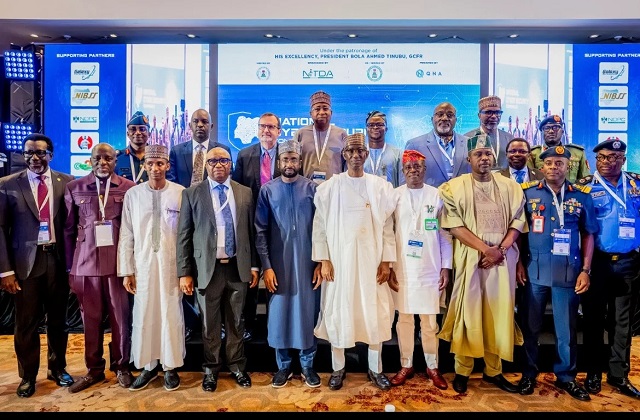-NSA, EFCC, NITDA, Stakeholders Chart Unified Path at National Cybersecurity Conference
News Highlights:
- Nigeria Establishes National Cybersecurity Coordination Centre
- EFCC to Launch Cybersecurity Research Centre by 2026
Amid rising concerns over digital threats in Nigeria’s fast-evolving technological landscape, the Federal Government has declared its resolve to fortify the country’s cyberspace with robust policies, strengthened institutions, and coordinated national efforts.
This commitment took centre stage at the maiden National Cybersecurity Conference (NCSC) held in Abuja on Wednesday, a two-day event jointly organized by the National Information Technology Development Agency (NITDA) and the Office of the National Security Adviser (ONSA).
The conference, themed “Building a Resilient Digital Future,” brought together over 175 institutions including embassies, government ministries, universities, security agencies, and tech companies.
Declaring the conference open, National Security Adviser (NSA), Malam Nuhu Ribadu, called the event “a defining moment in Nigeria’s digital security journey,” as he emphasized the urgency of building resilience against growing cyber risks.
“Building a resilient digital future is not just a theme; it’s a call to action,” Ribadu declared. “Nigeria’s accelerating digital transformation brings economic opportunity but also increased vulnerability. Resilience is no longer optional, it is the bedrock of national security and economic stability.”
Ribadu announced that a National Cybersecurity Coordination Centre has been established to enable real-time responses to cyber threats, and further disclosed that the Federal Government is updating the National Cybersecurity Policy and Strategy to address artificial intelligence (AI) and other emerging technologies.
In addition to these reforms, Ribadu cited the Executive Order on the Protection of Critical National Information Infrastructure (CNII) and an ongoing review of the Cybercrime Act as part of Nigeria’s effort to enhance its digital defense mechanisms.
He also noted that improved coordination with telecom operators and security agencies is underway to protect critical telecom infrastructure.
The urgency of Nigeria’s cybersecurity needs was echoed by Mr. Ola Olukoyede, Executive Chairman of the Economic and Financial Crimes Commission (EFCC), who spotlighted the vulnerabilities in the country’s booming fintech ecosystem.
According to him, banking malware, cryptocurrency scams, fake fintech apps, and social engineering are among the major threats currently undermining digital trust.
To confront these challenges, Olukoyede revealed that the EFCC is expanding its digital forensic capabilities and deepening inter-agency intelligence sharing. A key part of this plan includes the establishment of a Cybersecurity Research Centre by 2026.
“The centre will aim to redirect the skills of cybercriminals, commonly known as ‘Yahoo Yahoo’ boys, towards productive use,” he said. “Let us not wait for the next major cyber-attack. Resilience is the future. The EFCC will continue to monitor, investigate, and prosecute digital financial crimes.”
Malam Kashifu Inuwa, Director-General of NITDA, said the conference was conceived to catalyze collaboration between government institutions, private sector actors, academic institutions, and international partners.
According to him, it will enhance the protection of critical infrastructure through the development and implementation of robust cybersecurity policies, regulatory frameworks, and compliance mechanisms.
He added that the conference will also facilitate global partnerships to combat cyber threats and improve cross-border intelligence sharing. Beyond that, it is expected to promote cybersecurity education and skills development through competitions, hands-on training, and technical sessions.
Furthermore, it will encourage investment in cybersecurity technologies by showcasing innovative solutions and industry best practices from both local and international players.
Senator Shuaibu Salisu, Chairman of the Senate Committee on ICT and Cybersecurity, stressed the need to bridge the legislative gap, and urged NITDA to engage digitally-inclined lawmakers with adequate orientation on relevant legislation, noting that insights from the conference would significantly aid in updating Nigeria’s Cybercrime Law.
As Nigeria navigates its digital future, the consensus from stakeholders is clear: cybersecurity must be prioritized not only as a technical challenge but as a national security imperative with legislative, economic, and societal dimensions.

